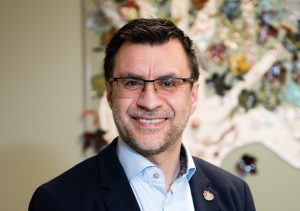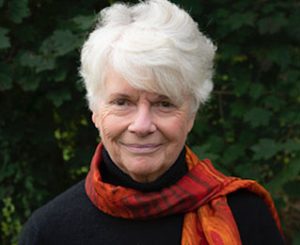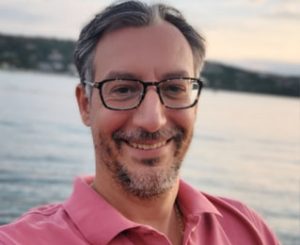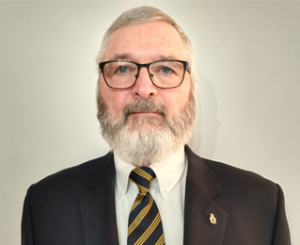Every year, the Canadian Institute for Military and Veteran Health Research (CIMVHR) hosts an annual forum that brings together hundreds of researchers, policy makers, service providers, peer support organizations and intermediary organizations to present the latest health research focused on military and Veteran health.
This year, the Atlas Institute for Veterans and Families is participating for the second time since our inception. Our goal is to continue strengthening our networks and explore potential collaborations on both national and international scales. At the same time, we aim to share information and raise awareness about our research in the Veteran and Family mental health and well-being space. A key focus for us at the CIMVHR Forum 2023 is to continue advocating for the practice of bringing the experiences of Veterans and their Families forward in conversations about issues that affect them.
If you are attending the CIMVHR Forum 2023, we invite you to visit our booth and attend our podium and poster presentations to learn more about how, together, we are creating positive change for Veterans and Families across Canada.
Posters:
- Presenter: Andrew Nicholson, PhD, Assistant Professor, School of Psychology, University of Ottawa, and Clinical Research Director, the Atlas Institute
- Summary: Moral injury is a trauma syndrome that can emerge following perceived violations of deep moral beliefs by oneself or trusted individuals. This study examined the impact of sexual orientation minority stress (i.e., discrimination) on moral injury symptoms. Here, we will discuss novel themes surrounding moral injury development among sexual minorities.
- Presenter: Victoria Carmichael, MSc, Senior Knowledge Mobilization Specialist, the Atlas Institute
- Summary: This abstract summarizes the co-creation process and highlights key lessons learned from a recent project involving the development of an evidence-informed resource hub (MindKit.ca) with youth from Canadian military and Veteran Families. This information could be useful to inform future engagement work with youth.
Podiums:
- Presenter: Niki Hosseini-Kamkar, PhD, Neuroimaging Research Associate, the Atlas Institute
- Date/Time: TBC
- Session: TBC
- Summary: Experiencing trauma increases risk for developing various psychological problems, including posttraumatic stress disorder (PTSD). Here, we analyzed data from 83 neuroimaging studies. We found that experiencing trauma is linked with heightened amygdala reactivity and reduced prefrontal cortex activity (PFC). The amygdala is involved in processing threats, while PFC is involved in self-regulation and decision-making.
- Presenter: Jonathan Lieberman, BSc, PhD student, Neuroscience, McMaster University, under the supervision of Dr. Andrew Nicholson
- Date/Time: TBC
- Session: TBC
- Summary: We compared brain activity and clinical outcomes between two neurofeedback studies in which individuals with PTSD downregulated amygdala or posterior cingulate cortex (PCC) activity. Evidence suggests that downregulating the PCC, as opposed to the amygdala, may be more effective for reducing PTSD symptoms and normalizing PTSD-associated alterations in brain activity.
- Presenter: Sandhya Narikuzhy, BSc, PhD candidate, Neuroscience, McMaster University, under the supervision of Dr. Andrew Nicholson
- Date/Time: TBC
- Session: TBC
- Summary: Bodily self-consciousness is often compromised in individuals with posttraumatic stress disorder (PTSD). This could be due to functional alterations in the temporoparietal junction (TPJ), a brain region involved in multisensory integration. We wondered if functional connections of the TPJ might differ between PTSD and its dissociative subtype from healthy controls.
- Presenter: Cath Virelli, MHSc, Senior Knowledge Mobilization Specialist, the Atlas Institute
- Date/Time: TBC
- Session: TBC
- Summary: The Atlas Institute co-designed multimedia resources about intimate partner violence with members of the Veteran community. The resources reflect needs and lived experiences shared by these individuals. The resource development process suggests opportunities for optimizing projects that aim to meaningfully integrate the lived experiences of Veterans and Veteran Families.
- Presenter: Adelina McCall, MSc, Research Associate, the Atlas Institute
- Date/Time: TBC
- Session: TBC
- Summary: Veterans Affairs Canada (VAC)’s well-being framework comprises seven domains, including housing and physical environment. This particular domain includes “the built environment (e.g. housing) as well as the natural environment (e.g. water and air quality),” with the desired outcome of “safe, adequate and affordable housing” (Pound, 2019). While VAC currently measures this domain using a single indicator – the percentage of Veterans among Canadian homeless – housing and physical environment is much broader and spans characteristics beyond just homelessness. Measures of housing and physical environment implemented across the literature are quite varied (Rautio et al., 2018), and there is no consensus on a standard measurement tool. This presentation will share the results of a review to identify and characterize instruments that measure this domain, report on their psychometric properties, and identify which provide the best reliability, validity and usefulness for Veterans and their Families.
- Presenter: Kate MacEachern, PhD, Senior Research Associate, the Atlas Institute
- Date/Time: TBC
- Session: TBC
- Summary: According to data from the Life After Service Survey (LASS), 29% of Veterans of the Regular Force reported fair or poor mental health in 2019 (Sweet et al., 2020). This is significantly higher than the 9% of the Canadian population reporting fair or poor mental health in the 2019 Canadian Community Health Survey (Statistics Canada, 2020). Given the implications of such a high prevalence of poor mental health for the Veteran community, it is important to substantiate the mental health status of Veterans in Canada and to identify potential risk or protective factors. The Canadian Longitudinal Study on Aging (CLSA) includes a Veteran subsample and provides an opportunity to explore the self-reported mental health in a Veteran sample. The purpose of this study will be to: i) determine if prevalence of self-reported mental health is similar for the Veteran cohort in the CLSA compared to LASS and ii) evaluate if socio-demographic, behavioural and health factors are differentially associated with self-reported mental health in the CLSA Veteran cohort compared to the LASS.
Overview
The psychiatric management of PTSD is a three-part webinar series designed to provide participants with an understanding of the role medication plays in treating posttraumatic stress disorder (PTSD), emphasizing the significance of a personalized approach that addresses the distinct needs of the Veteran population.
Continue reading to learn more about this webinar series, including how to register.
Audiences
- Prescribers (e.g. medical doctors, psychiatrists, nurse practitioners)
Includes licensed medical professionals who are authorized to prescribe medications for the treatment of mental health disorders including PTSD.
- Non-prescribing mental health professionals (e.g. therapists, counsellors, social workers)
Includes professionals who provide psychological or therapeutic support to individuals with PTSD, but who do not prescribe medication.
- Veterans and their Family members
Includes Canadian Veterans who have been diagnosed with PTSD or are seeking to better understand its management, as well as their Family members who play a critical role in supporting the Veteran’s recovery.
Sessions
The psychiatric management of PTSD — for prescribers
This webinar will provide an in-depth look at medication-based PTSD treatments for Veterans. Prescribers will gain insights into medication classes, dosing, potential side effects and considerations unique to the Veteran population, including polypharmacy risks and co-occurring conditions. The webinar will also cover recent advancements in medication and other treatments to help prescribers make informed choices in managing PTSD symptoms effectively and compassionately.
Date: September 18, 2025
Time: 12:30 – 2 p.m., Eastern time
Location: Virtual
Language: English
Cost: No cost
Registration deadline (prescribers): September 16, 2025
The psychiatric management of PTSD — for non-prescribing professionals
Designed for non-prescribing professionals such as therapists and social workers, this webinar will explore how medication-based treatments can complement therapeutic interventions for PTSD. Participants will learn how to better support Veterans undergoing medication therapy, recognize effects medications can have on mood and behaviour and collaborate effectively with prescribers. This webinar highlights how a combined medication-based and therapeutic approach can provide a well-rounded, effective PTSD treatment plan.
Date: October 2, 2025
Time: 12:30 – 2 p.m., Eastern time
Location: Virtual
Language: English
Cost: No cost
Registration deadline (non-prescribing professionals): September 30, 2025
The psychiatric management of PTSD — for Veterans and Families
This webinar will provide Canadian Armed Forces and Royal Canadian Mounted Police Veterans and Families with accessible, practical knowledge about how medications and other forms of treatment can work to treat PTSD. The webinar will offer clarity on how medication-based treatments can aid recovery by helping Veterans and Families actively participate in the treatment process.
Date: October 9, 2025
Time: 3 – 4:30 p.m., Eastern time
Location: Virtual
Language: English
Cost: No cost
Registration deadline (Veterans and Families): October 7, 2025
Registration
Registration for this event has now closed. Please contact the implementation team if you have questions or would like to access the recording: implementation-atlas@theroyal.ca
Webinar details
Each webinar will consist of a 60-minute presentation by a clinical expert, followed by a 30-minute live Q&A session.
For prescribers: September 18, 2025, 12:30 – 2 p.m., Eastern time
For non-prescribing professionals: October 2, 2025, 12:30 – 2 p.m., Eastern time
For Veterans and Veteran Families: October 9, 2025, 3 – 4:30 p.m., Eastern time
About the presenters

Dr. Richardson is the Medical Advisor to the Atlas Institute for Veterans and Families, the Scientific Director of the MacDonald Franklin OSI Research Centre and a Consultant Psychiatrist at St. Joseph’s Operational Stress Injury Clinic. He holds the Tanna Schulich Chair in Neuroscience & Mental Health and is a Professor in the Department of Psychiatry at the Schulich School of Medicine & Dentistry, Western University. In addition, he is a Research Fellow with the Canadian Institute for Military and Veteran Health Research (CIMVHR).
With more than two decades of experience in the assessment and treatment of Canadian Armed Forces members and Veterans, Dr. Richardson is recognized as one of the foremost experts on military-related PTSD and other operational stress injuries. He has authored over 100 peer‐reviewed articles and book chapters. His research spans risk factors for PTSD and suicidal ideation, health care utilization, treatment outcomes, and the impact of PTSD on quality of life.

Polliann Maher is the Lived Expertise Lead, Families at the Atlas Institute for Veterans and Families. She is the spouse of a Veteran with posttraumatic stress disorder and brings to her role more than 20 years of lived experience in navigating the mental health system. Polliann is passionate about educating the Veteran community and sharing her knowledge of the resources that are available to them. She is a strong advocate around changes that encompass the Family, which are many times an afterthought or forgotten.

Brian McKenna served for 19 years in the Canadian Army, retiring as a Warrant Officer. In that time, he served in Bosnia twice, both as a signaller and then a section commander. Brian then deployed to Afghanistan twice, once with the Canadian Army and once again as a NATO counter-improvised explosive device instructor. While seeking medical treatment post-release, Brian joined with other Veterans in petitioning the government for the creation of a centre focused on Veteran and Family mental health issues, resulting in the establishment of the Atlas Institute. Brian currently serves as National Strategic Advisor, Veterans, for the Atlas Institute.
Eligibility requirements
The webinar series is designed for prescribers, non-prescribing professionals, Veterans and Veteran Family members interested in deepening their understanding of medication and other forms of treatment for PTSD and in enhancing their support for Veterans.
To register, you must:
- Be eligible under one of the three target audiences: Prescribers, non-prescribing professionals, Veteran/Veteran Family member.
- Be currently living and/or providing care in Canada.
- Be comfortable participating in English or using French captioning.
We encourage applications from members of groups with historical and/or current barriers to equity. The Atlas Institute is attentive to the diversity of our network and invites you to self-identify during registration if you wish. Responses from applicants who self-identify during the registration process will only be shared with training organizers at the Atlas Institute. These groups include:
- First Nations, Métis and Inuit Peoples
- Persons with visible and/or invisible (physical and/or mental) disabilities
- Members of a group(s) that commonly experience discrimination due to race, ancestry, colour, religion and/or spiritual beliefs, or place of origin
- Persons who identify as women
- Persons of marginalized sexual orientations, gender identities and gender expressions
The Atlas Institute is committed to providing an accessible environment for participants attending webinars. Part of this commitment includes offering closed captioning on the video components of the webinar.
October 2, 2025
October 9, 2025
A new research study, using neurofeedback as a treatment for post-traumatic stress disorder (PTSD), is showing promising results in reducing symptoms and improving rates of remission. The study, conducted by the Atlas Institute, the University of Ottawa, Western University and the University of Geneva, is adding significantly to evidence that neurofeedback is on par with gold-standard treatments for PTSD.
Join us and a panel of experts and people with lived experience to learn more about what neurofeedback is and how it heals parts of the brain that are impacted in the aftermath of trauma, and that contribute to PTSD symptoms.
Our panel of experts and people with lived experience will discuss:
- What neurofeedback is and how it can be used to treat PTSD
- Why it is particularly useful for treating complex disorders like PTSD
- How neurofeedback works to heal altered brain activity in the aftermath of trauma
- The ways this flexible treatment method can be incorporated into therapeutic treatment plans
Dr. Andrew Nicolson, Director of Clinical Research at the Atlas Institute, will share findings from his current research, and will co-facilitate a discussion with a person of lived experience, and a panel of experts. Participants will be invited to ask questions and share insights.
Panelists
Andrew Nicholson, PhD, BSc
 Dr. Andrew Nicholson is the Director of Clinical Research at the Atlas Institute for Veterans and Families as well as an Assistant Professor within the School of Psychology at the University of Ottawa. As a scientist at the University of Ottawa’s Institute of Mental Health Research, he also holds the Atlas Institute Chair of Minority Stress and Trauma Research. Dr. Nicholson completed his Ph.D. in Neuroscience at Western University, Schulich School of Medicine and Dentistry, with Dr. Ruth Lanius. He then went on to complete two postdoctoral fellowships at the Homewood Research Institute (HRI), Canada, and at the University of Vienna, Austria/the University of Zurich, Switzerland.
Dr. Andrew Nicholson is the Director of Clinical Research at the Atlas Institute for Veterans and Families as well as an Assistant Professor within the School of Psychology at the University of Ottawa. As a scientist at the University of Ottawa’s Institute of Mental Health Research, he also holds the Atlas Institute Chair of Minority Stress and Trauma Research. Dr. Nicholson completed his Ph.D. in Neuroscience at Western University, Schulich School of Medicine and Dentistry, with Dr. Ruth Lanius. He then went on to complete two postdoctoral fellowships at the Homewood Research Institute (HRI), Canada, and at the University of Vienna, Austria/the University of Zurich, Switzerland.
Nicholson’s research program is largely focused on better understanding the neural correlates of trauma and stress-related disorders, including PTSD. Additionally, his research aims to elucidate the neural underpinnings of minority stress/trauma exposure from an intersectional perspective (using neuroimaging modalities), in order to better understand the neurobiological basis of mental health burdens that disproportionally affect marginalized communities.
Sebern Fisher, M.A.
 Sebern F. Fisher, M.A., is a psychotherapist and neurofeedback practitioner who specializes in the aftermath of neglect and abuse in early childhood. She focuses on training the traumatized brain to learn its own regulation, which it can learn at any age. She trains professionals nationally and internationally on neurofeedback and on the need to integrate neurofeedback with psychotherapy. Her book, Neurofeedback in the Treatment of Developmental Trauma: Calming the Fear-Driven Brain, has helped her readers understand how the traumatized brain can give rise to explosive feelings, irrational thinking and destructive behaviour. When the brain learns its own regulation, its owner can engage meaningfully in psychotherapy and in life.
Sebern F. Fisher, M.A., is a psychotherapist and neurofeedback practitioner who specializes in the aftermath of neglect and abuse in early childhood. She focuses on training the traumatized brain to learn its own regulation, which it can learn at any age. She trains professionals nationally and internationally on neurofeedback and on the need to integrate neurofeedback with psychotherapy. Her book, Neurofeedback in the Treatment of Developmental Trauma: Calming the Fear-Driven Brain, has helped her readers understand how the traumatized brain can give rise to explosive feelings, irrational thinking and destructive behaviour. When the brain learns its own regulation, its owner can engage meaningfully in psychotherapy and in life.
Ruth Lanius, M.D., Ph.D.
 Dr. Ruth A. Lanius is a Psychiatry Professor and Harris-Woodman Chair at Western University of Canada, where she is the director of the Clinical Research Program for PTSD. She has over 25 years of clinical and research experience with trauma-related disorders, and established the Traumatic Stress Service at London Health Sciences Centre, a program that specializes in the treatment of psychological trauma. Dr. Lanius has received numerous research and teaching awards, including the Banting Award for Military Health Research. She has published over 150 research articles and book chapters focusing on brain adaptations to psychological trauma and novel adjunct treatments for PTSD. She regularly lectures on the topic of psychological trauma both nationally and internationally. She has co-authored The Effects of Early Life Trauma on Health and Disease: The Hidden Epidemic and Healing the Traumatized Self: Consciousness, Neuroscience, Treatment. Dr. Lanius is a passionate clinician scientist who endeavours to understand the first-person experience of traumatized individuals throughout treatment and how it relates to brain functioning.
Dr. Ruth A. Lanius is a Psychiatry Professor and Harris-Woodman Chair at Western University of Canada, where she is the director of the Clinical Research Program for PTSD. She has over 25 years of clinical and research experience with trauma-related disorders, and established the Traumatic Stress Service at London Health Sciences Centre, a program that specializes in the treatment of psychological trauma. Dr. Lanius has received numerous research and teaching awards, including the Banting Award for Military Health Research. She has published over 150 research articles and book chapters focusing on brain adaptations to psychological trauma and novel adjunct treatments for PTSD. She regularly lectures on the topic of psychological trauma both nationally and internationally. She has co-authored The Effects of Early Life Trauma on Health and Disease: The Hidden Epidemic and Healing the Traumatized Self: Consciousness, Neuroscience, Treatment. Dr. Lanius is a passionate clinician scientist who endeavours to understand the first-person experience of traumatized individuals throughout treatment and how it relates to brain functioning.
Tomas Ros, PhD
 Dr. Tomas Ros completed his PhD in 2010 under the supervision of Prof. John Gruzelier, exploring the impact of EEG neurofeedback on mechanisms of long-term brain plasticity. During the last 10 years, he has researched the potential of neurofeedback as a novel treatment for psychiatric disorders, namely, for individuals with post-traumatic stress disorder (in collaboration with Prof. Ruth Lanius at Western University) and attention-deficit hyperactivity disorder (in collaboration with Prof. Nader Perroud at University of Geneva).
Dr. Tomas Ros completed his PhD in 2010 under the supervision of Prof. John Gruzelier, exploring the impact of EEG neurofeedback on mechanisms of long-term brain plasticity. During the last 10 years, he has researched the potential of neurofeedback as a novel treatment for psychiatric disorders, namely, for individuals with post-traumatic stress disorder (in collaboration with Prof. Ruth Lanius at Western University) and attention-deficit hyperactivity disorder (in collaboration with Prof. Nader Perroud at University of Geneva).
Daniel Pelletier, CAF Veteran
 Daniel joined the Canadian Armed Forces in January 1973 where he spent his career as an infantryman. Over the 25 years in which he served 22 were in the Canadian Armed Forces and three years as a reservist with the Voltigeurs de Québec. He was a member of the 1st, 2nd and 3rd Battalion of the R22R as well as the 1st CDO, Airborne Regiment. Missions and assignments Daniel participated in were Cyprus 1975 and 1986, Montreal Olympics 1976, Jungle Warfare Training Australia 1976, landing maneuver Norway 1978, Germany 1979-83, Combat Arms School 1983, Airborne Regiment 1984-88, in charge of security for the ARMEX 85 International Exhibition in Ottawa, and Croatia in 1993-94. He retired as Master Warrant Officer in 1995 however he has remained active in military life acting as a FAC recruiting officer in Quebec 2001 and was the first OSISS peer support coordinator in Quebec 2002-2004.
Daniel joined the Canadian Armed Forces in January 1973 where he spent his career as an infantryman. Over the 25 years in which he served 22 were in the Canadian Armed Forces and three years as a reservist with the Voltigeurs de Québec. He was a member of the 1st, 2nd and 3rd Battalion of the R22R as well as the 1st CDO, Airborne Regiment. Missions and assignments Daniel participated in were Cyprus 1975 and 1986, Montreal Olympics 1976, Jungle Warfare Training Australia 1976, landing maneuver Norway 1978, Germany 1979-83, Combat Arms School 1983, Airborne Regiment 1984-88, in charge of security for the ARMEX 85 International Exhibition in Ottawa, and Croatia in 1993-94. He retired as Master Warrant Officer in 1995 however he has remained active in military life acting as a FAC recruiting officer in Quebec 2001 and was the first OSISS peer support coordinator in Quebec 2002-2004.
A member of the Royal Canadian Legion, Daniel has also taken Royal Canadian Legion Service Officer Training, Mental Health First Aid Training and served as an advisor to the research team Office of One Health & Wellness, Department of Sociology, University of Saskatchewan where he participated in research with veterans and their families as well as the contribution of service dogs. He is the co-author of a manuscript submitted to the Journal of Military, Veteran and Family and member of the lived experience cadre at the Atlas Institute for Veterans and their Families. He is involved with the Canadian Foundation for Animal Assisted Support and Services (cf4aass) and promoter for a project of Veteran handymen, who volunteer to help veterans with problems that require minor repairs to their homes.
Related Resources
The Atlas Institute for Veterans and Families is hosting a series of two-part virtual conversations with women Veterans of the Canadian Armed Forces (CAF) and the Royal Canadian Mounted Police (RCMP). These conversations aim to better understand the experiences and the mental health and well-being of women Veterans. The goal of these conversations is to inform the development of a research project with and for women Veterans.
The first conversations will take place virtually during the week of September 20, with various days and times available. The second follow-up series of conversations will take place virtually during the week of November 15, with various days and times available.
Registration will be open from July 27, 2022 to August 26, 2022.
There is a total of 25 spots available with five people in each session. These spots will be assigned on a first-come, first-served basis. There is also an option to provide your comments in writing or as an audio or video recording if you do not wish to participate in the live virtual conversations.
This event has ended.
For the first time as the Atlas Institute, we joined the CIMVHR Forum 2022 to introduce the following topics:
Podium:
Experiences of Afghan-Canadian language and cultural advisors who served with Canadian Forces abroad
- Presenter: Jean-Michel Mercier, MSc, Senior Research Partnerships Associate
- Date/Time: Tuesday, 18 October 2022, 12:20 p.m. – 12:40 p.m.
- Session: 3B05
- Summary: During Canada’s time in Afghanistan, Afghan-Canadian citizens were recruited to work as Language and Cultural Advisors (LCAs). These LCAs accompanied members of the Canadian Armed Forces outside the wire assisting with translation and teaching local culture and customs to the soldiers. Guided by an advisory committee, this ongoing qualitative study aims to identify the current mental health status of Language and Cultural Advisors who served with the CAF in Afghanistan, their perception of their experience and transition back to civilian life, and the types of support they perceive they would have needed upon their return. This presentation shared the preliminary results of the study, as well as described the process of working with an advisory group from the inception of the study.
Symposium:
- Presenter: Sara Rodrigues, Ph.D., Director, Applied Research
- Date/time: Tuesday, 18 October 2022, 4:50 p.m. – 5:10 p.m.
- Session: 5E02
- Summary: This presentation drew on the results of a study of the lived experiences of potentially morally injurious events (PMIEs) and their impacts for 38 public safety personnel. Our findings demonstrate that for PSP, PMIEs arise during the performance of role-specific duties, within or because of the organizational culture or climate, and as a result of inadequacies in the broader health care and social welfare systems. This presentation highlighted specific types of events that PSP describe as PMIEs, and the impact that these events have in terms of personal and professional values, as well as mental health and well-being.
Posters:
- Presenter: Ashlee Mulligan, MSc, Director, Partnerships and Stakeholder Engagement
- Summary: The Atlas Institute for Veterans and Families, Canadian Institute for Public Safety Research and Treatment (CIPSRT) and the Public Health Agency of Canada (PHAC) are collaborating as part of the Glossary 3.0 Senior Authors’ Team. This diverse, multi-institutional pan-Canadian group of academics and clinicians is working to develop Version 3.0 of the PTSD Glossary of Terms, which will be published in an upcoming special issue of Health Promotion and Chronic Disease Prevention in Canada (HPCDP). The purpose of the Glossary of Terms is to improve the accessibility of language related to mental health and mental health conditions for all Canadians and to work towards a universal set of terms for clinicians, scientists, policymakers, people with lived experience and the general public.
- Presenter: Gabrielle Dupuis, MSc, Director, Research Partnerships
- Summary: Peer support, or support between individuals with a similar lived or living experience, has been utilized for many years in various populations, including Veterans, Serving Members, and their Families. However, ambiguity still exists regarding the categorization of these activities and how they can be used to improve the well-being of individuals. This scoping review aims to describe the nature of peer support activities for Veterans, Serving Members, and their Families in the literature, and align their outcomes within the seven domains of the Veterans Affairs Canada well-being framework.
- Presenter: Cath Virelli, MHSc, Senior Knowledge Mobilization Specialist
- Summary: Evidence from the United States suggests that stigmatizing language in news stories about Veterans’ mental health may significantly influence public perceptions of Veterans. In turn, this can have negative impacts on Veterans’ and Veteran Families’ quality of life post-service. Problematically, the literature lacks guidance for journalists covering Veterans’ mental health and related concerns, such as suicide, particularly in the Canadian context. To begin to address this gap, the Atlas Institute for Veterans and Families collaborated with Dr. Robert Whitley of the Douglas Mental Health University Institute to develop a set of guidelines that may help journalists ensure news stories about Veterans’ mental health and related concerns are balanced, trauma-informed and recovery-oriented.
The Atlas Institute hosted an information booth to meet with military, Veteran and Family, researcher and service provider communities and to highlight some of our projects.
Learn about our pre-CIMVHR session and post-CIMVHR workshop, which took place on October 16 and 19, 2022, covering topics important to Veterans, their Families, and those who provide support services:
Pre-CIMVHR Session: Research and lived experience interactive panel discussion
The Pre-CIMVHR Research and Lived Experience Interactive Panel Discussion offered a space to promote understanding of research and empower Veterans and Families in research. Veterans and Veteran Families were invited to enter into an in-person dialogue with researchers to discuss research methods and life cycle, priorities, facilitators and barriers in research, and Veterans and Families’ needs in research.
Registration is closed.
AGENDA
Enhancing Veteran and Veteran Family engagement in research: Reflections from an interactive panel discussion
- Cultural awareness and building trust
- Developing studies with the engagement of people with lived experience in mind
- The future of engagement
- Final takeaways
Lived Expertise Lead, Veterans – Atlas Institute for Veterans and Families
Post-CIMVHR Workshop: Advancing the vision for a transformed mental health system for Veterans and their Families
This workshop featured a panel presentation sharing the results and implications of a collaboration between the Atlas Institute for Veterans and Families and Phoenix Australia to develop a new vision and implementation approach for Veteran and Veteran Family mental health systems globally. The session also facilitated dialogue among participants to identify stakeholders’ perspectives and resource needs in the implementation of a transformed model of care to improve the well-being of Veterans and their Families in the Canadian context.
Registration is closed.
Post-CIMVHR Workshop: Advancing the vision for a transformed mental health system for Veterans and their Families
Both sessions were held:
In person
Halifax Marriott Harbourfront Hotel,
1919 Upper Water St.,
Halifax, Nova Scotia, B3J 3J5